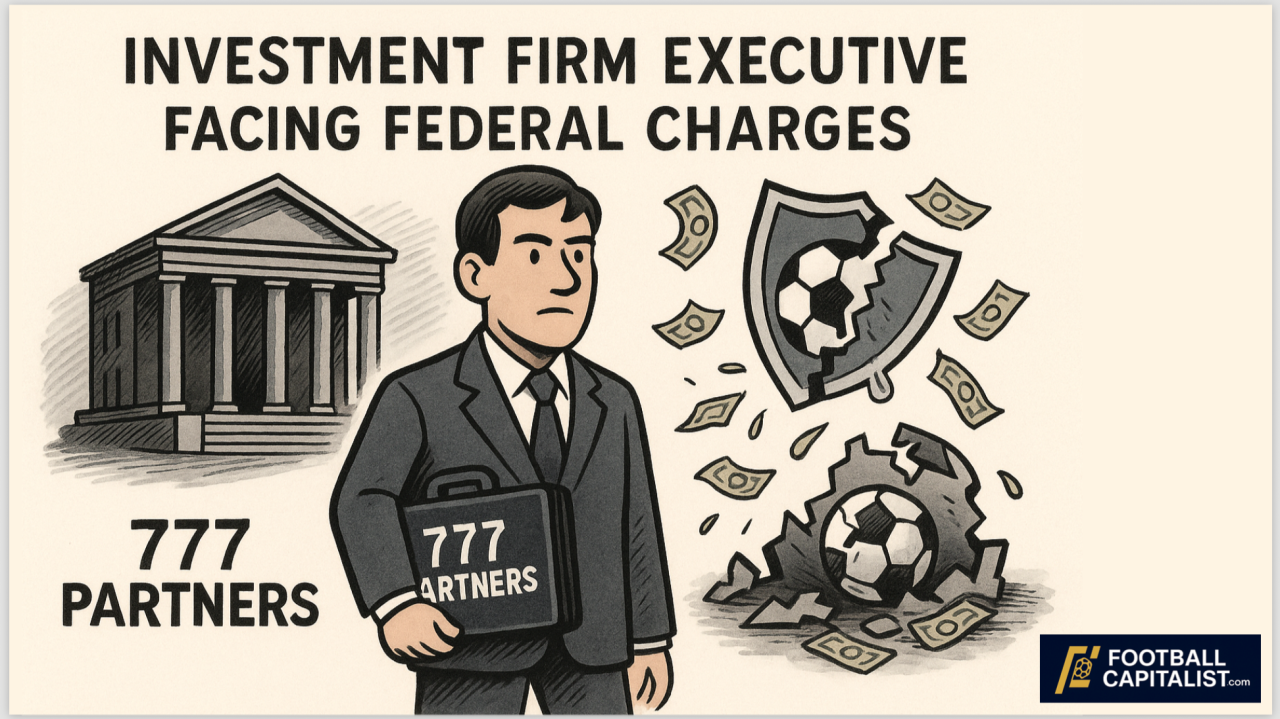As prosecutors allege a $500 million fraud scheme, questions mount over governance standards in multi-club football models.
On October 28, 2025, the U.S. Attorney’s Office for the Southern District of New York unsealed an indictment charging Joshua Wander, cofounder of Miami-based investment firm 777 Partners, with conspiracy to commit wire fraud, wire fraud, conspiracy to commit securities fraud, and securities fraud.
Federal prosecutors allege that Wander and his colleagues engaged in a multi-year scheme that defrauded lenders and investors of more than $500 million. The firm’s former Chief Financial Officer, Damien Alfalla, pled guilty earlier this month and is cooperating with investigators.
Wander surrendered to federal agents and is facing charges that carry maximum prison sentences of up to 20 years on certain counts.

Allegations at a Glance
According to the indictment, Wander and others:
- Pledged assets they did not own as collateral for credit facilities.
- Falsified bank statements to inflate cash balances.
- Diverted restricted funds away from structured settlement financing to bankroll acquisitions in riskier sectors.
The charges highlight how funds intended for structured settlement beneficiaries — typically injury victims receiving periodic payments — were allegedly redirected to cover unrelated investments, including professional football clubs in Europe.
“When financial firms lie to their lenders, they do not merely breach contracts. They undermine the integrity and stability of our credit markets and our financial system more broadly,” said U.S. Attorney Jay Clayton.
The FBI and Homeland Security Investigations described the alleged scheme as a “house of cards” that left investors and settlement recipients exposed.
Football Industry Exposure
777 Partners became a recognizable name in football after acquiring or pursuing stakes in clubs such as:
- Sevilla FC (Spain)
- Genoa CFC (Italy)
- Vasco da Gama (Brazil)
- Standard Liège (Belgium)
- Hertha Berlin (Germany)
The indictment suggests that restricted funds were used to finance some of these acquisitions. Combined with the 2024 bankruptcy ruling against 777 Partners in the High Court of London, the allegations intensify uncertainty around the firm’s football portfolio.
Broader Implications
The case raises wider governance questions for football:
- Oversight gaps: How rigorously are ownership groups vetted before acquiring clubs?
- Multi-club models: With increasing reliance on debt and alternative capital, are regulatory frameworks sufficient to assess financial stability?
- Investor confidence: What lessons can institutional investors and stakeholders take from this collapse?
For fans and local communities, these are not abstract issues. Clubs are cultural assets as much as financial ones, and unstable ownership structures can erode both trust and long-term sustainability.
Outlook
Wander faces significant legal consequences, while Alfalla’s cooperation is expected to shape the case further. The U.S. Securities and Exchange Commission has also initiated civil proceedings.
For European football, the episode will likely prompt renewed scrutiny of investor approval processes. UEFA and national federations may face pressure to strengthen transparency and financial oversight — ensuring that clubs do not become vehicles for opaque or misrepresented capital.
Key Takeaways for Industry Stakeholders
- Due diligence is critical: Clubs, leagues, and investors must strengthen vetting processes.
- Multi-club ownership models remain fragile: Without strong regulation, they pose systemic risks.
- Governance is as important as capital: Sustainable investment depends on transparency and accountability.
Note: This article summarizes publicly available information from U.S. authorities regarding ongoing legal proceedings. All individuals are presumed innocent until proven guilty. Our focus is on what these events mean for football governance, investment, and long-term industry stability.

